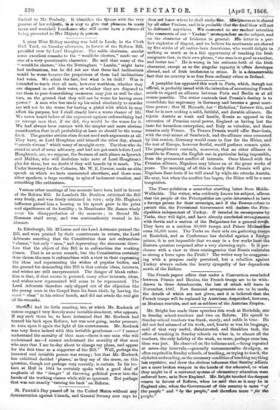Mr. Bright has made three speeches this week at Rochdale,
one to Sunday school-teachers and two on Reform. His speech to Sunday-school teachers was frank, manly, and noble in tone. He did not feel ashamed of his work, and, hearty as was his language, said of that very useful, disinterested, and thankless task, the office of teaching in Sunday schools on what is, to almost all the teachers, the only holiday of the week, no more, perhaps even less, than was just. He observed on the toilsome and,—being repeatei at seven-day intervals,—generally unremunerative drudgery, so often required in Sunday schools, of teaching, or trying to teach, the alphabet andreading, as the necessary condition of teaching anything lees repulsive, and drew the obvious inference that Sunday schools are a mere broken weapon in the hands of the educated, to what they might be if a universal system of elementary education were enforced here, as in New England. Mr. Bright touched the deepest reason in favour of Reform, when he said that so it may be in England also, when the Government of this country is more "of the people" and "b1, the people," and therefore more "for the people."






























 Previous page
Previous page